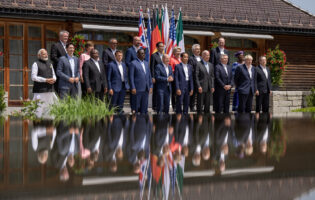A Party System for the Future?
On October 5, 2009, the American-German Institute (AGI) held a conference in Washington, DC, on “The German Elections – A Party System for the Future?” The event was generously supported by the Transatlantik-Programm der Bundesregierung der Bundesrepublik Deutschland aus Mitteln des European Recovery Program (ERP) des Bundesministeriums für Wirtschaft und Technologie (BMWi), the Dräger Foundation, and by the AGI Foreign & Domestic Policy Program, the Business & Economics Program, and the Society, Culture, & Politics Program. Part of the larger AGI project on “60 Years Federal Republic of Germany: Rebuilt, Reunified, Revitalized?”, the three panels brought together an interdisciplinary group of scholars and experts from Germany and the United States to examine the implications of the German elections, the development of the German party system, the expectations of foreign governments from the new German coalition, and the implications for reforming the German federal system.
The first panel discussed the impact of the recent German elections held in September 2009. The results produced a victory for Angela Merkel and the Christian Democratic Union (CDU) and its sister party, the Christian Social Union (CSU) of Bavaria. It was suggested that the Social Democratic Party’s (SPD) overwhelming defeat will most likely stoke a shift of the party to the left as it is placed into opposition after eleven years in government. Although the elections generated a decisive victory for the center-right parties, it also resulted in a dramatic decline for the “Volksparteien” altogether as the CDU/CSU and the SPD garnered only 40 percent of eligible votes. The outcome reinforced the six party system and highlighted the increased role of small parties in German politics. The surprising finish by the Free Democratic Party (FDP) signaled strong support for more liberal economic policies despite having suffered through Germany’s worst economic crisis since World War II. Some panelists argued that support for the FDP may have been in large part due to government subsidies that have propped up employment figures and shielded most Germans from the crisis so far. There was little doubt that the results would produce a center-right coalition between the CDU/CSU and the FDP. It was also noted that we will begin to see a shift in power from the parties to the chancellor as Merkel’s powers were severely limited under the grand coalition.
In domestic policy, the panel agreed that the new coalition will try to cut taxes as soon as 2011; however, the burgeoning deficit will make this all but impossible. They foresee potential conflicts within the government in areas of health reform, social welfare, employee protection laws against dismissal, and tax law reform. It was pointed out that subsidies have increased German labor costs by almost 20 percent and the public deficit is at an all time high of $80 billion, almost 5 percent of gross domestic product. These figures and the suggested tax cuts of €15-30 billion make it difficult to see how the new government will be able to balance a budget with lower revenues.
In the area of foreign policy, the panel agreed that policymaking will remain static and cautious. Germany will refrain from conflict with Russia and continue its mission in Afghanistan despite strong public opposition. One scholar argued that Germany risks losing its standing as an environmental leader as the federal deficit will lead to a watered-down climate policy.
The second panel delved deeper into the German party structure by examining societal changes in the party landscape. One panelist stated that it will be more difficult than ever to win a calculable majority with two parties in a six party system. It was also noted that the political culture in Germany has moved toward greater stability and the smaller parties – the FDP, Greens, and the Left Party – are in a position to increase their power. The results of the federal election demonstrated a change in party competition and those afraid of structural changes in the economy and globalization overwhelmingly voted for the Left Party. The panel highlighted the increase in votes for both the Green and the Left parties at the expense of the larger CDU and SPD while also pointing out that the “Volksparteien” suffered from voter apathy as each lost over a million votes to non-voters. The election of 2009 resulted in a north-south cleavage for the SPD as they continued to lose votes in the east to the Left Party.
Another theme which resonated throughout the panel was whether the dramatic gains by the FDP and the Left Party would have a positive or negative impact on their larger counterparts. One scholar stated that the SPD’s refusal to work with the Left Party as a coalition partner at the federal level will make it difficult for it to form a majority government in the future. In the run up to the federal election, the Left moved toward adopting a less radical election program, i.e., no longer mentioning socialism or a withdrawal from NATO. Furthermore, almost 700,000 voters migrated from the SPD to the Left and the latter took almost 26.4 percent of the vote in the eastern part of the country. As for the CDU, Merkel will continue to safeguard the welfare state despite increasing pressure from the FDP to cut taxes and dismantle employee protection laws. One panelist argued that the CDU’s newfound position as the largest party in Germany will increase its long-term chances of forming a government and limit the demands of its coalition partner, the FDP, as the FDP will ultimately choose to cooperate in order to keep itself out of the opposition and thus might have to make concessions.
The luncheon speakers discussed U.S. expectations of Germany after the elections. It was pointed out that NATO’s mission to Afghanistan is one of the most important issues with regard to transatlantic relations – especially considering that Germany is the third largest contributor to the Afghanistan mission. Since the Bundestag will have to decide about the renewal of the Afghanistan mandate in December, Afghanistan is the first foreign policy issue that the new federal government in Germany will have to deal with. Therefore, it will also be a case study for other foreign policy issues such as Iran or Russia, on which Germany, the EU, and the U.S. will have to cooperate. To be successful, a single transatlantic view is needed.
However, the panelists stated that Afghanistan did not play an important role during the German election campaign and it is not yet clear how the new German government will act on this issue. A vast majority of the German voters are against having German troops in Afghanistan and favor a foreign policy that focuses on peacekeeping missions and on police training. The speakers highlighted that with Barack Obama in office there are also more opportunities to strengthen transatlantic relations and to find common approaches on foreign policy issues, considering President Obama’s popularity in Germany and the German public’s approval of his international policies (92 percent). Moreover, the CDU’s new coalition partner, the FDP, will also have an impact on Germany’s foreign policy. Some representatives of the FDP have already criticized the old government for not working closer with President Obama and have called for a more active role in transatlantic relations. The speakers stressed that the United States would welcome the German government to be more active and creative in suggesting foreign policy solutions instead of acting passively. However, it was also stressed that it will pay for Merkel to be cautious on international policies, since this will boost her position domestically.
The afternoon panel discussed whether the German party system and federalism are a danger to economic reforms in Germany – an issue that seems to be of importance now more than ever in view of high deficits in public budgets. The speakers stressed that the German people generally appreciate the federal system; however, federalism also has a negative impact on the output of political processes, which becomes obvious in the term “Politikverflechtung” (political gridlock). The speakers focused in particular on the results of the first federal reform commission (FRC) in 2003-2004 and the possible impact of the ongoing second federal reform commission since 2007. As a result of the first FRC, laws that also had to be approved by the second chamber (Bundesrat) have been reduced.
Moreover, the Länder now have the right to pay their state employees – for example in the education sector – differently. One of the most important aspects of the second FRC is the so-called debt brake which has been introduced by the commission to stop further national debt as pre-existing measures to stop national debt (for example Article 115 in the Basic Law and the euro convergence criteria stated in the Maastricht Treaty) were unable to reduce government debt in recent years. Figures show that Germany’s national debt has increased up to 70 percent of GDP in 2009 and is expected to be about 80 percent by 2010. Nevertheless, with regard to the efficiency of the new rule, the panelists pointed out that the system itself needs a change and the debt brake rule might also be broken by the government. However, it was also highlighted that a similar debt rule succeeded in Switzerland. With the FDP now one of the governing parties, questions concerning a likely change in the tax code in Germany (i.e., lowering and simplifying taxes) were also raised. While the panelists stated that voters’ expectations need to be managed, it was at the same time pointed out that this might be difficult to realize since there is already a huge gap between spending and revenue. With regard to the EU, the panelists also discussed the possibility of an EU tax. On the one hand, it was stressed that the EU fulfills political tasks and therefore it could also have the power to gain revenues. On the other hand, it was pointed out that the European Parliament might become too powerful with having the right to raise taxes and, moreover, it is questionable what kind of tax it should be.







